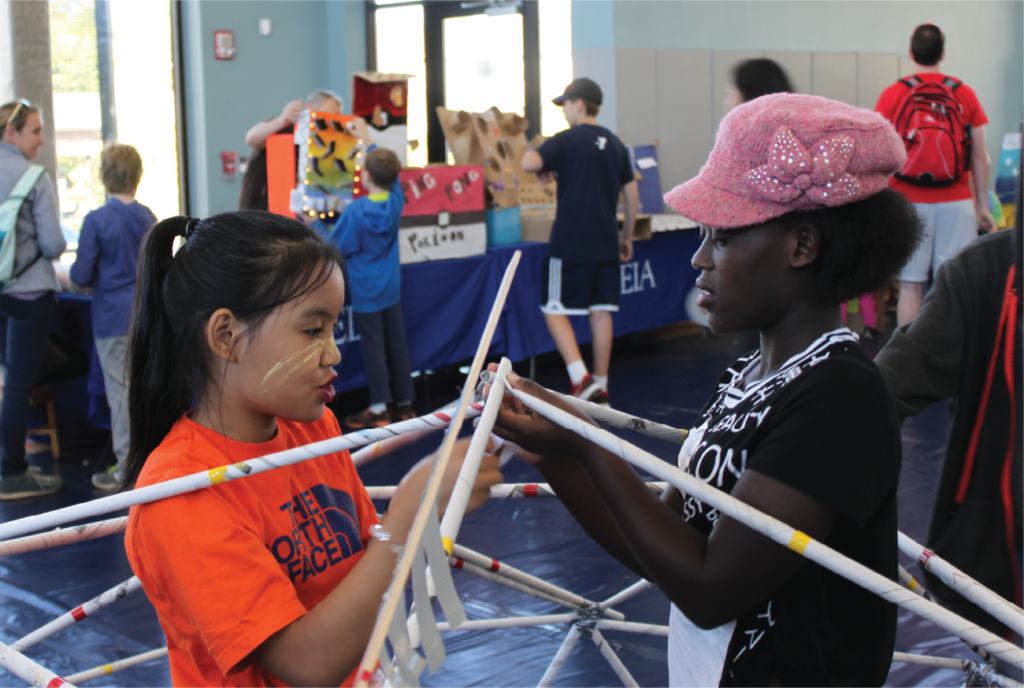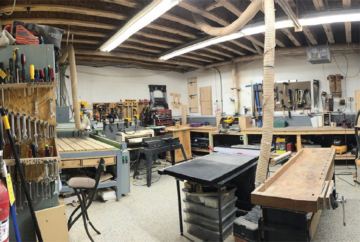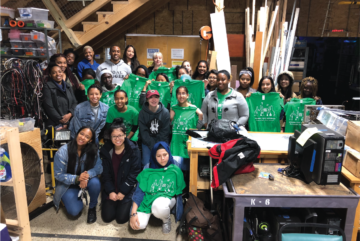Maker-Centered Learning Prepares Students for 21st Century Challenges

by Jennie Jiang | April 27, 2021
How would your education have looked different if you were encouraged to take risks and learn from your mistakes? If instead of worksheets and tests, you were given a problem for which you had to create and test a solution? If your classroom sometimes looked like a woodworking shop or a robotics lab?
For Global Village Project students, that world of learning is becoming even more accessible through a new multi-year partnership with Decatur Makers, a local community all-ages makerspace. While project-based learning and creative risk-taking have always been part of our GVP philosophy, this year, we are thrilled to launch our journey with Decatur Makers toward integrating maker-centered learning into GVP’s curriculum and pedagogy. The partnership comes through the national Making Spaces Program, led by the California-based nonprofit Maker Ed with support from the Children’s Museum of Pittsburgh.
As described by Maker Ed, maker-centered learning “offers a transformational approach to teaching and learning that attends to the real and relevant needs of learners and humans. It is an approach that positions agency and student interest at the center, asking students to become more aware of the design of the world around them, and begin to see themselves as people who can tinker, hack and improve that design.” More than the stuff that is made, maker education is about “the connections, community, and the meaning we can make, and…the power to decide what our futures hold.”
 At Global Village Project, this approach to learning promises to elevate our STEAM curriculum to become even more student-centered, hands-on, and empowering. The partnership with Decatur Makers is designed to dovetail with GVP’s existing integrated learning units, which tie together concepts from English language and literacy, science, math, social studies, and the arts around common themes like habitats, migrations, and rights. Located just a few blocks from our school, Decatur Makers offers a makerspace with tools from a microbiology lab to a fully-equipped wood shop, which beg to get learning, as GVP’s STEAM Coordinator Danielle Ereddia puts it, “out of the worksheet and into students’ hands.”
At Global Village Project, this approach to learning promises to elevate our STEAM curriculum to become even more student-centered, hands-on, and empowering. The partnership with Decatur Makers is designed to dovetail with GVP’s existing integrated learning units, which tie together concepts from English language and literacy, science, math, social studies, and the arts around common themes like habitats, migrations, and rights. Located just a few blocks from our school, Decatur Makers offers a makerspace with tools from a microbiology lab to a fully-equipped wood shop, which beg to get learning, as GVP’s STEAM Coordinator Danielle Ereddia puts it, “out of the worksheet and into students’ hands.”
Through the partnership, students will take regular field trips to the Decatur Makerspace, learn how to use the technology, and take on making projects big and small throughout the year. Some of the potential projects include building models of scientific concepts, such as plate tectonics and anatomical organs, or completing “build” challenges designed to demonstrate scientific concepts like forces and motion, gravity, light, and sound. GVP students may even take on building Tiny Libraries to set up around Decatur and Clarkston, a project for which they will take the lead in designing, constructing, and potentially even stocking and distributing the libraries for the benefit of the community.
Beyond the content of the projects, however, the real learning lies in the process. Maker-centered learning emphasizes 21st century skills like communication, collaboration, creativity, and critical thinking, which prepare students to tackle the existing challenges we face. As Danielle says, “Maker-centered learning offers students invaluable opportunities to practice productive risk-taking, taking students out of their comfort zone so they can learn from mistakes through trial and error…That kind of experiential learning is so natural in life, but harder to replicate in a classroom.” Maker education aims to close that gap between the real world and the classroom, pushing students to problem solve, troubleshoot, learn in community with others, and to advocate, exercise agency, and take ownership over their learning.
 These skills are all especially beneficial to culturally and linguistically diverse students like those at GVP. As Danielle explains, “We know that refugee learners need two things: they need intense English practice…and they need social and emotional support.” Both of these core goals are bolstered by maker-centered learning. Above all, literacy is a tool of empowerment and agency – and what better way to practice English than by collaborating and problem-solving with peers? In addition, creating opportunities for students to take risks and learn from and with each other is a key way in which maker-centered learning supports the social and emotional needs of refugee learners.
These skills are all especially beneficial to culturally and linguistically diverse students like those at GVP. As Danielle explains, “We know that refugee learners need two things: they need intense English practice…and they need social and emotional support.” Both of these core goals are bolstered by maker-centered learning. Above all, literacy is a tool of empowerment and agency – and what better way to practice English than by collaborating and problem-solving with peers? In addition, creating opportunities for students to take risks and learn from and with each other is a key way in which maker-centered learning supports the social and emotional needs of refugee learners.
GVP’s partnership with Decatur Makers is just the latest step in our quest towards ensuring that our educational model offers real, tangible value to students’ everyday lives and futures. The greatest challenges of our time – from climate change to global inequality – will not be solved through lectures and multiple-choice tests. They will be tackled through courageous risk-taking and innovation, and at GVP, we fully intend to equip our students well for those endeavors.
